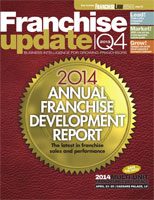The Song Remains the Same: Franchise Brands are Still Failing to Respond to Prospects
When it comes to franchise sales, it seems the more things change, the more the development practices of many franchisors remain the same.
This was a key finding of Franchise Update Media Group's annual Mystery Shopping survey, unveiled at the 15th annual Franchise Leadership & Development Conference in Atlanta in October. Across the board, our expert team of mystery shoppers found that, despite technological advances that make it easier than ever to connect with qualified prospects, franchise sales and development teams don't always pursue promising prospects with the fervor, immediacy, and persistence they would in a world of best practices.
"The constant frustration in the mystery shopping results is the failure of franchisors to respond to qualified inquiries," says Steve Olson, president of Franchise Update. "There is an epidemic. It's just not happening."
This year's survey of 101 franchisors, representing 34,509 units, (31,047 franchised units and 3,462 company-owned units) is an annual conference extra for franchise brands that pre-register. A team of franchising specialists posed as qualified candidates to "shop" franchisors by phone and online. The secret shoppers evaluated lead generation and recruiting practices for ease of access, response time, and follow-up.
The phone survey revealed some dismal findings:
- a paltry 3 percent of sales staff were available to respond to the mystery shoppers' first telephone call, down from 22 percent the previous year;
- 72 percent of calls resulted in messages on voicemail or with a receptionist;
- 32 percent of sales staff never returned the call; and
- 11 percent had a wrong phone number or no phone number on their site.
Online performance didn't fare much better, despite the fact that a brand's website is the most crucial tool in a franchisor's development arsenal. While 23 percent of franchisors responded to a website inquiry within a day, more than half (52 percent) did not follow up with the qualified prospect. Additionally, 22 percent failed to email the prospect, and 15 percent did not email or call. Researchers also found that many franchisors are not equipped to handle the sales leads they generate.
This poor response rate is costly to franchisors, says Olson. "The average cost per lead is $55 across all industries, so you are basically burning $55 every time you don't respond to a qualified lead."
There is some good news. Mystery shoppers reported that franchisors who did engage with candidates are savvier at closing the deal, says Tom Wood, president of Floor Coverings International, and who also served as Conference Chair. "Closing rates are climbing," he says. "Franchisors are becoming better and smarter at engaging well with candidates."
Website Response
Jeff Sturgis, Chief Development Officer, McAlister's Deli
(Note: This mystery shopping was conducted when Sturgis was still with Franchise System Advisors.)
I submitted leads for 94 franchisors by entering information into their website lead forms. I then engaged in one phone call with each franchisor representative who contacted me and evaluated them for their effectiveness in how they handled this first call.
Similar to previous years, the number of franchisors that called me after I submitted a request for franchise information was disappointing. This year, of the 94 leads submitted, I received calls from only 45 franchisors. Of the franchisors I did speak with, most did a good or better job of handling the first call. Most responded within 24 hours; most asked me a series of questions to gauge my interest and qualifications; and most of the calls lasted between 5 and 8 minutes, an appropriate amount of time for a first call. But again, fewer than 50 percent of the franchisors I shopped called me.
I didn't really notice any significant changes from the previous 3 years I have done this. There does seem to be a bit less reliance on using virtual brochures to deliver information. And in general, most sales representatives treated the first call as more of a fact-finding mission and less as a time to start building rapport. This is reflected in the continued insistence that the next step in the process be my completing an application, rather than having a second conversation.
Overall, the speed of response by franchisors was pretty good. The same franchisors seem to be the ones doing well each year.
Recommendation: First of all, call your leads! Second, follow up after the first conversation. Anecdotally, I would say fewer than 50 percent of the franchisors that I spoke with called me again--even though we had a generally productive first call. I think franchisors rely too much on candidates completing an application after one phone call to gauge their level of interest.
Telephone Response
Marc Kiekenapp, Kiekenapp & Associates
Our project was to visit the website, search for the franchise development phone number, and call the franchisor to request information. Most phones rang at the front desk or went into an electronic voicemail system. If we did not make contact on the first attempt, we left information and waited for a return call.
Almost all franchisors' telephone systems are not set up for user-friendly messaging or reaching the individual who can help them. If prospects are pushed into voicemail, quality leads are being lost. This is very similar to my past years of mystery shopping.
I did not see any difference from last year in the lack of rapport-building. I did notice financial qualification questions being asked more; in about half the conversations it was very direct, rather than conversational. It seemed the development teams and qualifiers pushed much harder on this than in previous years. Teams should take the time to warm up the phone call and take an interest in the candidate (most franchisors were more interested in gathering information at the expense of a relationship).
In general, brands that had qualifiers seemed to take more of an interest in the candidate during the initial call than concepts without qualifiers, which were not organized or did not have a trained person to gather information.
The teams we reached seemed to be knowledgeable about the concept and knew how to deliver the two-minute elevator speech and create some interest in the concept. Recommendation: Mystery shop your franchise development teams, check phone numbers, and test your development websites to make sure everything is working correctly. Take the time to build rapport to get "good" information from candidates. Implement an ongoing training program to monitor and improve systems.
Franchisee Satisfaction
Michelle Rowan, Franchise Business Review
Our franchisee satisfaction survey was available at no cost to all franchisors that pre-registered for the event. This year we surveyed 66 companies (7,598 franchisees responded), compared with 60 companies in 2012 (5,747 responses). We sent our standard survey questions to all open and operating franchisees by email and collected data on each brand.
Franchisees were questioned using a standard satisfaction evaluation that asks them to rate their systems in the areas of financial opportunities, training and support, leadership, operations and product development, core values, general satisfaction, and the franchisee community. Using the compiled data, each participating franchisor received a Franchise Satisfaction Index (FSI) score along with the average FSI score in their industry.
Our survey found that the FSI benchmark of participating conference attendees was 67.4, 3 points lower than our overall industry benchmark over the past 12 months. Overall, we have seen our benchmark FSI improve in the last year by 3.3 points (68.8 in August 2013, compared with 65.5 in August 2012). The benchmark from attendees saw an increase of only 0.58 (68.11, compared with 67.53 in 2012). The surprising piece is that the benchmark of conference attendees was lower than the industry overall.
Transparency in the development process has improved. The Internet has somewhat forced the issue, but the end result is that the brands with the support to back up what they are selling are rising to the top of the pile. Along these lines, we've seen brands getting better at setting realistic expectations for candidates. Franchise sales is less about painting a rosy picture and more about managing expectations so franchisees know what they're getting going in, and as a result, are more satisfied/less disappointed overall. Still, there continues to be a disconnect between the development and operations teams. There is an opportunity to tie their goals (and/or compensation) together, with everyone setting the same expectations and delivering on them.
Bottom line: Make sure the system is happy and strong, otherwise all the money and effort you throw at bringing more franchisees on board is wasted.
Recommendation: Franchisors should continue to set expectations up front in the sales process. And, if possible, provide markers for them to hit in the first six months, year, etc., so they can make sure they are on track with the best of the best.
Social Media
Jon Carlston, Process Peak
With mobile usage of the web increasing by 125 percent over the past year, we knew it was vitally important to look at the use of social media by franchise brands. Consumers are going more to their handhelds and less to their desktops, which affects how franchises are found online. We discovered a wide disparity in how franchisors are using social, local, and mobile technologies (SoLoMo) to connect with and further engage prospective candidates and customers for their franchisees.
We surveyed more than 150 brands with questions about their corporate website presence, including how they are doing in the mobile space and how they are monitoring and managing their reputation online. We discovered that while 66 percent of respondents provide microsites to their franchisees:
- only 33 percent use plug-ins on these microsites;
- 20 percent have integrated a Google+ link on their main site;
- 87 percent have integrated a Facebook link; and
- 73 percent have a Google+ corporate page.
When you see that 87 percent of franchisors have a Facebook link on their website and 73 percent have a Google+ corporate page, it is clear that these things have reached the mainstream. Yet, there is not a great understanding of how to use these tools. Having the presence is essential, but it is really just the first step.
One of the most surprising things we discovered is that fewer than 5 percent of franchisors have responded to negative reviews or comments in a public way. It could be that they just aren't sure how to best go about this. There is a conversation going on out there, and you need to give your brand a voice. You can't afford to let the discussion around your brand be run by detractors.
Recommendation: We suggest that brands take incremental steps into this SoLoMo realm. If you haven't claimed your franchisees' listings on Facebook and Google+, that is job number one, because that gets you on the map (literally). Then you're in position to take the next step and further the engagement with your fans--and prospects who want to know more about your concept. Social media has become mainstream. You can't afford to ignore it. Take small steps and wade in. Your brand will thank you for it.
Mobile Response
Michael Alston, Landmark Interactive
We studied franchise recruitment trends in more than 25 million visits since 2010 across our network of franchise portals (Franchise.com, FranchiseOpportunities.com, FranchiseSolutions.com, FranchiseGator.com, and BusinessBroker.net). We analyzed how people connected to the Internet (mobile phones, tablets, laptops, desktops), how many submitted investment inquiries, and how much available capital the prospects had.
For the second year in a row, mobile phones and tablets doubled their share of investment leads submitted by prospective franchise buyers. More than one-third of the investment inquiries now come from mobile devices: 37.9 percent of all visitors to the network of portals, and 34.7 percent of all qualified investment inquiries to franchisors. This is a hefty new marketing channel, not a fad.
We were surprised to see that leads from mobile phones are growing at a faster rate than from tablets, with phones' share up 130 percent (a factor of 2.3 times) in just 12 months. That is a significant change from last year, when tablets showed the fastest growth.
One thing that hasn't changed: tablet users are high-value prospects and were 10.7 percent more likely to request information on brands requiring an investment of $100,000 or more.
Recommendation: Franchisors must make sure their recruitment efforts are represented well on several kinds of smartphones, as well as on tablets and desktop computers. Portals are one way to do that, but franchisors' websites should be mobile-friendly as well.
Fast Response by Franchisors
Joel Gooch,
eMaximation
The more quickly franchisors respond, the more likely they are to move a prospect through the sales process--not surprising, and consistent with research we conducted in previous years.
We found that more of our clients are dedicating resources to reviving older prospects, and in some cases with great success. (Some of this may be attributed to our emphasizing this in marketing strategy discussions with our clients, but we've also seen many franchise marketers, without prompting, become savvier and more creative in maximizing the leads they already have.) Despite this uptick, we feel that most companies are still failing to take full advantage of their lead list to mine for prospects who had previously cooled, but whose interest may have renewed.
We've seen an increase in the priority placed on the quality of corporate websites to generate leads; however, many franchise marketers are struggling to create the content for websites, drip campaigns, and landing pages. Franchisors that do have quality content to share are at a huge advantage and can fully leverage lead management systems to accelerate franchise sales.
Recommendation: We think it's essential that franchisors adopt a lead management system to capture, distribute, nurture, and analyze their leads. Beyond that (and at the risk of self-promotion), we feel the next great opportunity for franchisors to grow their businesses is by incorporating a "prospect engagement platform" into their marketing. We recently launched a tool that allows a franchisor to lay out a candidate's individual path to franchise ownership, track their activities, communicate with them inside the app, and unlock steps as they move through the qualifying process. This type of engagement marketing has yielded an 84 percent increase in franchise applications and is quickly gaining traction among our clients.
Share this Feature
Recommended Reading:
STAY CONNECTED
Subscribe to our newsletters to stay informed on the hottest trends in Franchising.
FRANCHISE TOPICS
- Multi-Unit Franchising
- Get Started in Franchising
- Franchise Growth
- Franchise Operations
- Open New Units
- Franchise Leadership
- Franchise Marketing
- Technology
- Franchise Law
- Franchise Awards
- Franchise Rankings
- Franchise Trends
- Franchise Development
- Featured Franchise Stories
FEATURED IN

Franchise Update Magazine: Issue 4, 2013








 The franchise listed above are not related to or endorsed by Franchise Update or Franchise Update Media Group. We are not engaged in, supporting, or endorsing any specific franchise, business opportunity, company or individual. No statement in this site is to be construed as a recommendation. We encourage prospective franchise buyers to perform extensive due diligence when considering a franchise opportunity.
The franchise listed above are not related to or endorsed by Franchise Update or Franchise Update Media Group. We are not engaged in, supporting, or endorsing any specific franchise, business opportunity, company or individual. No statement in this site is to be construed as a recommendation. We encourage prospective franchise buyers to perform extensive due diligence when considering a franchise opportunity.